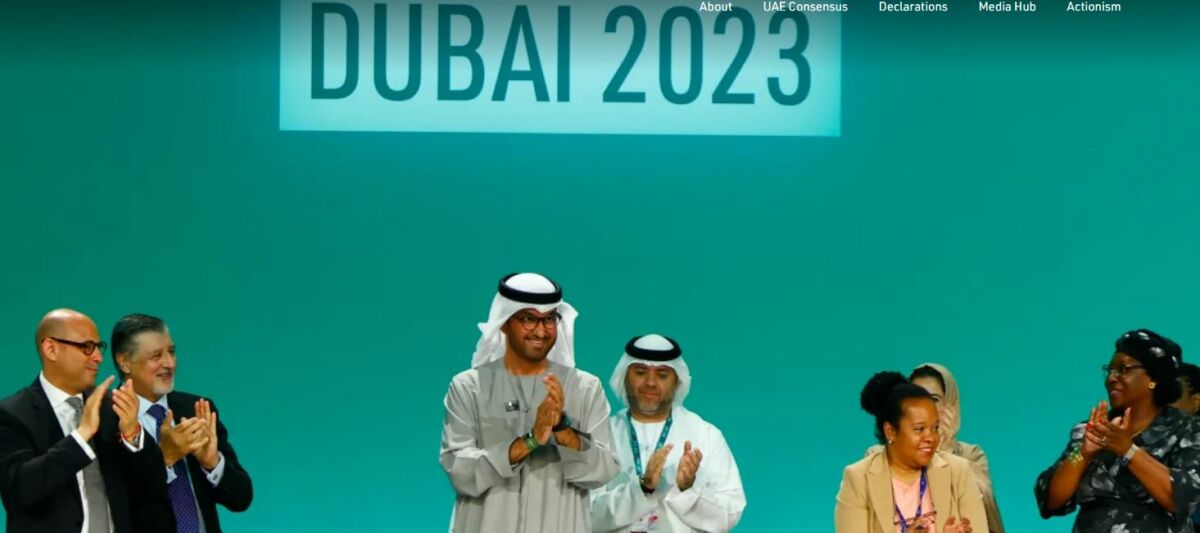COP28: Eight initiatives and announcements to follow
[January 2024] At COP28 when all attention was focused on the final declaration by the Parties, numerous initiatives were launched outside the official negotiations: declarations under the Emirati presidency, initiatives led by UN bodies or States, businesses... Here is a round-up of 8 initiatives to follow in the coming months.

Analysis note of the Global Observatory of Climate Action
- Author: Tania Martha Thomas, Research Officer at the Observatory
- Date: January 2024
At COP28, when all attention was focused on the final declaration by the Parties, numerous initiatives were also launched outside the official negotiations: declarations under the aegis of the Emirati presidency, commitments initiated by UN bodies or individual States, initiatives by businesses or philanthropic organizations… Here is a look back at eight announcements to keep an eye on for climate action in the coming months.
1. Philanthropies committing to adaptation and resilience
Thirteen philanthropic foundations committed themselves to increase private funding for adaptation and resilience, with a phased program of work leading up to COP30.
These foundations have pledged to “increase their learning, coordination, investment and global impact”, while coordinating their strategies. They also pledge to challenge current implementation standards, which they see as a potential barrier to adaptation efforts, and to focus on transformative impact rather than funding levels, as well as to adopt local adaptation practices.
The foundations also call for closer engagement with a wider sphere of actors, including governments, civil society, financial and international institutions. This initiative could help reduce the adaptation funding gap, given that current flows of climate finance are largely directed towards mitigation efforts, even in the case of philanthropic funding.
2. Brazil’s proposal for a new tropical forest conservation fund
At the start of the two-week conference, Brazil proposed a new forest conservation fund, aimed at providing 80 tropical countries with financing to help maintain tree cover, by allocating annual payments based on hectares conserved or restored. Brazil reportedly intends to raise $250 billion from sovereign wealth funds and other investors, including those in the oil and gas industry..
The proposal, called “Tropical Forests Forever”, is still being developed and would function through an international organisation where funds could be deposited and through which new funds could be raised through low-risk bonds. While the idea has received positive reactions, being hailed as a new approach to conservation funding, it remains to be seen whether it will be implemented. Currently, despite increasing funding, the rate of deforestation is slowing at an extremely low pace worldwide, and carbon sinks in tropical forests are disappearing.
3. Global Cooling Pledge
With the rise in temperatures, energy demand and emissions linked to air conditioning and space cooling are increasing, as is the number of people threatened by lack of access to air conditioning.
Against this backdrop, over 60 countries have signed the “Global Cooling Pledge”, a joint initiative of the “Cool Coalition” under the United Nations Environment Programme (UNEP) and the UAE Presidency of the COP.
Commitments include a reduction in emissions from cooling (currently responsible for 7% of global emissions) by at least 68% by 2050 compared to 2022, the promotion of so-called “passive” cooling strategies (which consume zero net energy), and “universal access to vital cooling systems, reducing pressure on energy grids and saving trillions of dollars by 2050”.
4. UAE Declaration on Sustainable Agriculture, Resilient Food Systems and Climate Action
The Sharm el-Sheikh workstreams on agriculture and food security are the only official UNFCCC workstreams on agriculture and food systems. They follow on from the Koronivia joint workstreams on agriculture established at COP23. The main objective of COP28 was to establish an operational roadmap, but this year’s negotiations resulted in an essentially procedural text.
However, on the same theme, under the presidency of the United Arab Emirates, 159 countries – representing more than three-quarters of global food system emissions – signed the UAE Declaration on Sustainable Agriculture, Resilient Food Systems and Climate Action. The signatories pledge to include food systems in their Nationally Determined Contributions (NDCs) and other national plans by COP30.
On the same day, more than 200 non-state actors signed a call to action for the transformation of food systems. These announcements and signatures were accompanied by financial commitments: $890 million from the CGIAR research consortium, $57 million from the Bezos Earth Fund for food systems transformation and around $47 million from Norway for adaptation, largely for small-scale farmers.
5. Oil & Gas Decarbonization Charter
The OIl & Gas Decarbonization Charter was launched at COP28 by the UAE Presidency and the Kingdom of Saudi Arabia, who announced that 50 oil and gas companies had joined the initiative, “dedicated to large-scale impact and accelerating climate action within the industry”.
Specifically, the companies pledge to “align with” the net-zero target by 2050, reduce methane emissions to zero and eliminate flaring by 2030. For some, these commitments had already been formulated as part of previous initiatives, such as the Zero Routine Flaring initiative (2015) on gas flaring.
The current signatories (BP, Exxonmobil, Shell, Adnic, Equinor and Saudi Aramco) account for more than 40% of global oil production, and more than 60% of their members are national oil companies, which have so far proved to be the worst performers in terms of decarbonization.
Critics have also pointed out that the initiative focuses solely on operational emissions, ignoring downstream emissions from fossil fuel use, which can account for up to 80% of these companies’ footprint.
6. Joint Statement on Climate, Nature and People
With COP28 being the first major climate event after the historic COP15 agreement on biodiversity in December 2022, many new initiatives and commitments focused on the interconnectedness of the climate and biodiversity crises, and how actions can meet the objectives of the Kunming-Montreal Global Framework for Biodiversity and the Paris Agreement.
Thus, the Emirati presidency of COP28 climate and the Chinese presidency of COP15 announced a Joint Statement on Climate, Nature and People, initially supported by 15 countries, which pledged to ensure coherence between their next national climate commitments (their NDCs, in other words), due to be submitted before the climate COP in 2025, and their next national nature plans, due to be submitted before the biodiversity COP later this year. The declaration was widely welcomed by civil society groups who have long advocated recognition of the link between environmental crises.
7. Utilities for Net Zero Alliance
As part of this initiative led by IRENA and the UNFCCC High-Level Champions, 25 major utilities from around the world have formed the Utilities for Net Zero Alliance (UNEZA), to promote the adoption of renewable energies, accompanied by the necessary infrastructure.
The alliance is also intended to serve as a platform for overcoming supply chain bottlenecks and supporting the flow of capital to the power sector in the Global South.
The alliance’s member utilities include TAQA (Abu Dhabi National Energy Company of the United Arab Emirates), EDF, E.ON, Enel, Engie, Iberdrola, Jinko Power, RWE, Uniper and others, and together represent more than 250 million customers. Currently, 84% of the 68 largest utilities have no net-zero targets aligned with IEA scenarios, and 32% have made no commitments to increase their low-carbon power capacity.
8. Taskforce on Net Zero Policies of Non-State Entities
COP28 also saw the launch of the Net Zero Policy Taskforce, which aims to help translate into policy the recommendations of the UN Secretary-General’s High-Level Expert Group (HLEG) on Net Zero Emissions Commitments by Non-State Entities.
The working group will seek to ensure that the credibility and accountability of net-zero commitments aligned with 1.5 °C targets are underpinned by coherent policies.
This initiative comes a year after the publication of the HLEG’s recommendations in the “Integrity Matters” report at COP27. The taskforce will include the Principles for Responsible Investment (PRI) (which will provide the secretariat), the United Nations Environment Programme Finance Initiative (UNEP FI), the United Nations Conference on Trade and Development (UNCTAD), the Vulnerable 20 (V20) group, International Financial Reporting Standards (IFRS) and others. The taskforce will also create a space for sharing knowledge and best practice between policymakers and regulators, and provide the necessary research and technical support.









